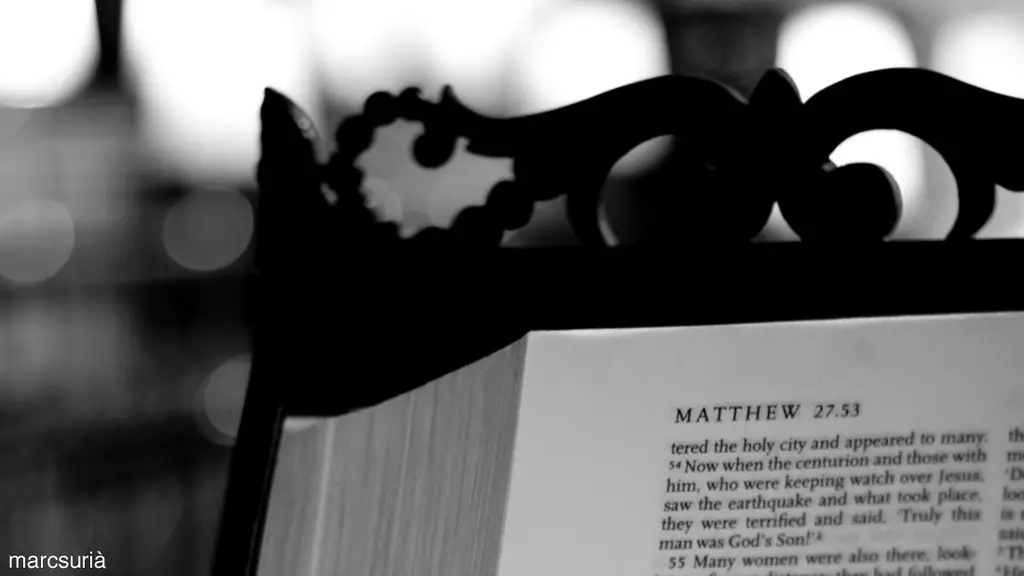Circumcision has had a long history in many cultures and religions, particularly in the Bible. Long seen as a mark of covenant between God and those who followed Him, it can be seen as a rite of passage that signified the connection of a person to their faith and their commitment to abide by its laws. While the practice of circumcision dates back to antiquity, it is also a sign of religious devotion in today’s world as well.
In the Bible, circumcision appears in two distinct contexts. It is described both as a sign of a covenant between God and the Israelites, and as a physical act that separated those who were part of the covenant from those who were not. One of the earliest mentions of the practice of circumcision is in the Book of Genesis, when God tells Abraham to circumcise himself and his sons. This was seen as a sign of Abraham’s faithfulness to God’s covenant with His chosen people. It was also seen as a symbol of purity and holiness, and it was a way to distinguish Jewish men from their neighbors who did not follow God’s laws.
The Bible also describes the importance of circumcision in the Book of Leviticus, where it is made clear that the act was to be practiced by the Israelites because it was commanded by God. Additionally, circumcision was seen as a necessary act prior to coming into the Temple, signifying the need for inward cleansing. The practice of circumcision in the Bible is further interpreted by religious scholars as an act of purification of the soul and body.
Although some people today may see circumcision as outdated or unnecessary, religious authorities point out that, as described in the Bible, it is a sign of true devotion and dedication to God’s laws. It is seen as a way to show a connection to a higher power and to signify a desire to abide by the sacred law. For those who follow the faith, circumcision is viewed as a necessary act, one that demonstrates the importance of spiritual purity.
For many Jews, circumcision is a powerful symbol that links them to the ancient tribes and traditions of Israel, marks the transition from boyhood to manhood, and serves as a physical connection to their faith. It is often seen as an especially meaningful act, as it serves to signify their adherence to God’s word as prescribed in the Bible.
While the act of circumcision is seen by many religious authorities as a sign of faith, there is much debate about the necessity of this practice today. Some people argue that it is no longer a necessary act for religious purity, as it has been largely supplanted by advances in medical technology. Others oppose the practice on moral and ethical grounds, believing that it represents an unnecessary mutilation of the body.
Whatever one’s views on the practice of circumcision, the importance of the act in the Bible cannot be denied. It is an integral part of Jewish faith and tradition, and is seen as an outward sign of commitment to God and His laws.
The History of Circumcision in the Bible
The practice of circumcision has a long and storied history in the Bible, as it is mentioned numerous times throughout both the Old and New Testaments. In the Old Testament, it was first and foremost presented as a covenant between God and His people that extended beyond the natural line of generations. Abraham is the first man to be commanded circumcision, and it is presented as the everlasting sign of God’s covenant of faith.
The act of circumcision was seen as a sign of devotion, and was prescribed by God as a religious ritual that was to be carried out from generation to generation. The circumcision of a Jewish male was seen as signifying his place among the people of God’s covenant. It was a physical reminder of the chosen people’s connection to their faith and commitment to abide by its laws.
However, in the New Testament, there is a shift in the understanding of circumcision. It is no longer seen as an outward sign of the covenant between God and His people, but instead as a symbol of inward spiritual purification. Paul’s writings are particularly instructive on this point, as he clearly outlines the importance of faith as opposed to physical acts such as circumcision.
Despite this shift in understanding, circumcision remained a vital part of Jewish faith, as it is seen in the practices of early Christian churches. In fact, circumcision was still a requirement for those wishing to join the church. It was seen as an essential part of conversion, as it signified a literal cleansing of the flesh and a renewed commitment to their faith.
Contemporary Views on Circumcision in the Bible
Today, circumcision has become a subject of debate among religious scholars. Many people now see it as no longer a necessary act in order to enter the covenant with God, as it is believed that faith in God and adherence to His laws is enough to attain spiritual purity. As a result, the practice of circumcision is no longer embraced by some faith-based communities.
At the same time, many religious leaders continue to advocate for the necessity of circumcision in the Bible. For them, circumcision remains an important practice because it signifies dedication and covenant with God. While there may be disagreement about its necessity in today’s world, it is clear that it played a central role in the formation of the Jewish faith.
In addition to this, it is also important to note that, while circumcision was originally prescribed by God in the Bible, it is not always mentioned in a positive context. While it was seen as a sign of spiritual purity at the time, it has also been used as a sign of bondage or slavery in certain parts of the world. For example, some African slaves were forcibly circumcised to signify their bondage to their masters.
The debate over circumcision is ongoing and has become increasingly complex in recent years. While there is disagreement about its necessity, its importance in the Bible is undeniable.
Modern Medical Science and Circumcision
In the modern age, advances in medical technology have sought to reduce the perceived necessity of circumcision in the Bible. In particular, studies have shown that the procedure is no longer necessary for the purposes of hygiene or health, as modern techniques offer a safer and more effective means of maintaining personal cleanliness.
At the same time, circumcision is still seen by many religious authorities as an important part of devotion to God. For Catholics, Orthodox and Protestant Christians, as well as Jews and Muslims, the practice is viewed as a way to demonstrate faith and commitment to the teachings of their faith. In fact, for some individuals, it is seen as an important part of the conversion process.
Despite the advances in medical science, many religious sects continue to practice circumcision. This is partly because the procedure can serve as a physical reminder of the faith and commitment to God, and partly due to the continued importance and relevance of the ritual in their religion.
Ultimately, while many believe that circumcision is no longer necessary, the practice still holds a special place in the beliefs and customs of several religions and faith communities. The importance of the ritual in the Bible remains strong, and for those who see it as a necessary part of their faith, the process is viewed as a vital reminder of their covenant with God and the associated requirements.
Controversy & Morality of Circumcision
As mentioned previously, there is significant disagreement about the morality of circumcision today. In the medical community, there are those who view the procedure as a form of unnecessary mutilation, claiming that it is an outdated practice that is no longer necessary for health or hygiene. At the same time, many religious authorities insist that the practice is an essential part of faith, and urge those of their faith to participate in the ritual as a sign of devotion to God.
The debate over the morality of circumcision is especially heated in the Western world, where many countries have recently banned the practice. In the United States, the practice is particularly controversial, as it is seen by many as a violation of human rights. However, it is important to note that, while the practice is illegal in some countries, it is still widely practiced in many others.
At the end of the day, the debate over circumcision is largely a personal one. For some, the procedure is seen as a necessary part of devotion to their faith, while for others it is viewed as an outdated and unnecessary act. Whatever one’s opinion, it is clear that the act of circumcision has a long and storied history in the Bible, and continues to be an important part of many religious traditions today.
Conclusion
In summary, circumcision has a long and varied history in the Bible, from its presentation as a covenant between God and His chosen people to its interpretation today as a symbol of spiritual purity. While some view the practice as unnecessary and even immoral today, many religious authorities continue to advocate for its importance and relevance. Whatever one’s opinion, it is clear that the act of circumcision has been an important part of the Bible and continues to carry spiritual and religious significance in many faith communities today.





